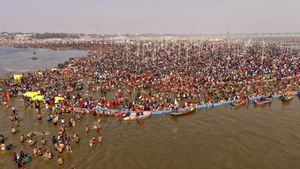Kyiv and Moscow are once again entangled in accusations following the recent missile strike on a boarding school located in the Ukrainian-occupied town of Sudzha, situated within the Kursk region of Russia. On February 1, 2025, the attack claimed the lives of at least four individuals who were taking refuge there, prompting both countries to exchange blame over the fatal incident. The school was providing temporary shelter for civilians preparing to evacuate as the war continues to rage on.
According to reports from the Ukrainian Armed Forces, the missile strike targeted the school with guided aerial bombs. They indicated it was aimed expressionlessly at civilians, saying, "On February 1, the Ukrainian Armed Forces committed another war crime by launching a targeted missile strike on a boarding school..." This statement, attributed to Russia's defense ministry, asserted their view of the situation and pointed fingers toward Kyiv.
The fatal incident is not isolated but rather mirrors the pattern of violence witnessed throughout the nearly three-year-long conflict. Ukrainian President Volodymyr Zelensky responded passionately to the event, stating, "They destroyed the building even though dozens of civilians were there." His words were echoed across social media platforms, where he criticized the manner in which the Russian military operations had unfolded.
Tragedy struck not only for those at the school but across Ukraine, where over the weekend, missile attacks resulted in additional civilian casualties; officials reported at least 15 deaths, including 11 fatalities in Poltava alone. The strike on Poltava, which killed several, reflecting the extensive ruins of the building and the urgency of rescue operations, drew public attention and despair as firefighters and rescue teams scrambled to pull survivors and victims from the wreckage.
Local Poltava resident Olena Svyryd recounted the horror of the missile strike, stating, "On the fifth floor, a woman, my friend, was carried out. She’s not alive. She was crushed by the wall. There were a lot of casualties." Such deeply personal accounts underline the devastating human cost of the conflict, which continues to escalate unabated.
Focusing back on the Kursk incident, the Ukrainian military reported four dead and at least 80 rescued from the rubble, with several individuals being treated for serious injuries. Critical responses followed from both nations as the atmosphere thickened with sentiments of vindication and accountability. Russia's response implicated the Ukrainian military, claiming they acted aggressively by targeting civilian structures.
The battlefield dynamics are complex. Ukraine's military had launched significant incursions across the border, taking control of various settlements and towns. Notably, Sudzha was among the areas of strategic value seized during these operations. This military maneuvering has been characterized by both sides as necessary, yet reckless toward civilian safety.
Rescue efforts and emergency services remain active amid backdrop of violence, with reports indicating evacuations from both occupied and conflict-affected regions. The Ukrainian president, visibly anguished by the loss of life and destruction mirrored his language toward Russia, branding them as "a state devoid of civility," and linking current actions to historical transgressions of the Russian military.
International diplomacy seemingly lingers as mere rhetoric with both U.S. President Donald Trump and Russian President Vladimir Putin expressing readiness for negotiations whilst making no movement toward concrete outcomes. The situation remains volatile. Civilians trapped within the borders find themselves encircled by rapid military evolution and unexpected hostilities.
Despite diplomatic calls for resolutions, those affected bear the brunt of continuing warfare. The human cost of this conflict intensifies daily as evidence accrues during exchanges of fire and retaliatory attacks. Reports of civilian casualties are now commonplace, firmly establishing next to the discussions of military maneuvers and political rhetoric.
While Ukraine remains resilient, the strikes across multiple fronts affirm the reality of enduring combat. The devastating repercussions on infrastructure and civilian life generate lamentations often met with nationalistic fervor from both sides. Yet the question remains—how soon will the resolve for peace be recognized amid the growing tide of sorrow encapsulated by both the missile strikes and the continuous spinning narrative of blame?
Both nations stand temporally poised for future engagements, sparking urgency for diplomatic engagements. Yet, as individual lives continue to be shattered and families torn apart, the grave realities of war become increasingly pronounced. The recent missile incidents serve only as reminders to the world about the pressing need to advocate for peace, accountability, and humanitarian efforts to alleviate suffering.



